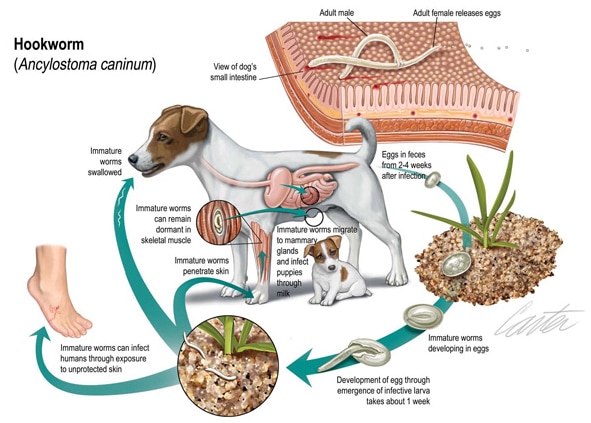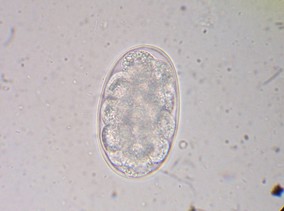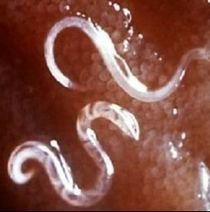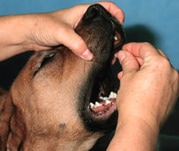Warning - Hookworm outbreak
At Northern Territory Veterinary Services, we are seeing many dogs in the NT getting sick from a relatively easily preventable illness. Pups are in particular danger of dying from this disease. What’s an even more concerning development is that we recently are seeing adult dogs succumbing to this horrible illness. What is it? Hookworms. Yes! Hookworms. There are several worms that can cause health problems but recently hookworms have been rearing their ugly heads. We have seen an unusual number of worm infested dogs, especially puppies. Regular worming is easy to forget but it is so important to keep your pets healthy, both in the young and old.
So what’s so unusual about this wet season? Well, we see a lot of these infections in the wet as the worms require water droplets to hatch out. So this wet season being particularly big and particularly long, we are seeing heavier burdens and greater number of animals affected.
So what’s so unusual about this wet season? Well, we see a lot of these infections in the wet as the worms require water droplets to hatch out. So this wet season being particularly big and particularly long, we are seeing heavier burdens and greater number of animals affected.
What is hookworm?
The hookworm is a particularly nasty parasite (about 3mm long) that hooks onto the inside of the intestinal wall and sucks out a large amount of blood to feed. Puppies can become infected before birth, through the milk when feeding from their mum, or through the skin from the environment. This worm causes blood loss, weight loss, pain, failure to thrive and in severe cases, death. Unfortunately, hookworm infestation is usually first noticed when the pup is already very sick with very pale gums, lethargy or bloody diarrhoea. Adult dogs are more resistant but we do diagnose infections in them too, particularly when the environmental conditions are right. They can cause a more slow lingering illness in adult dogs.
The hookworm is a particularly nasty parasite (about 3mm long) that hooks onto the inside of the intestinal wall and sucks out a large amount of blood to feed. Puppies can become infected before birth, through the milk when feeding from their mum, or through the skin from the environment. This worm causes blood loss, weight loss, pain, failure to thrive and in severe cases, death. Unfortunately, hookworm infestation is usually first noticed when the pup is already very sick with very pale gums, lethargy or bloody diarrhoea. Adult dogs are more resistant but we do diagnose infections in them too, particularly when the environmental conditions are right. They can cause a more slow lingering illness in adult dogs.
Can I catch it?
Hookworm is transmissible to humans. Personal hygiene is always important;- wash your hands after handling your dog and definitely before eating, Hookworm larvae can also hatch out in the yard and then burrow through the skin and cause itching. Children are particularly at risk.
Hookworm is transmissible to humans. Personal hygiene is always important;- wash your hands after handling your dog and definitely before eating, Hookworm larvae can also hatch out in the yard and then burrow through the skin and cause itching. Children are particularly at risk.
So how do we do we stop the cycle of infection?
Prevention is the best cure, and regular worming of all your dogs throughout their lives will help stop the vicious cycle of re-infection.
Puppies must be wormed from 2 weeks of age and every 2 weeks until they are 12 weeks old then every month until 6 months of age. From then on, worming every 3 months is adequate, unless otherwise advised. Talk to one of our veterinarians for further advice. Over time, with regular worming, your dogs can act as vacuum cleaners for the yard and clean up the environment.
Cats don’t get hookworm but they are at risk of other intestinal worms, and so they should have a regular worming routine as well. Luckily for those slightly less sociable puddytats, there are effective top spot all wormers available now from vets. Phew!
Prevention is the best cure, and regular worming of all your dogs throughout their lives will help stop the vicious cycle of re-infection.
Puppies must be wormed from 2 weeks of age and every 2 weeks until they are 12 weeks old then every month until 6 months of age. From then on, worming every 3 months is adequate, unless otherwise advised. Talk to one of our veterinarians for further advice. Over time, with regular worming, your dogs can act as vacuum cleaners for the yard and clean up the environment.
Cats don’t get hookworm but they are at risk of other intestinal worms, and so they should have a regular worming routine as well. Luckily for those slightly less sociable puddytats, there are effective top spot all wormers available now from vets. Phew!
| Treatment? Pop a pill – it’s that easy! Always use a good quality broad spectrum wormer, and make certain the animal is weighed before dosing. Under-dosing is common. It not only increases the risk of worm resistance but can be a complete waste of money as the product won’t be effective. We recommend Drontal as the most effective intestinal wormer. You are more than welcome to bring your pet to our clinic for a weight check. |
New dog? What to do…
When you pick up a new puppy make sure the breeder gives you information on when the puppy was wormed and what was used. If they cannot do this, it is best to assume the pup hasn’t been wormed. Any new dogs or pups should be wormed as soon as possible to avoid infecting your own yard with worms.
If in doubt, just ask
If you have a new puppy or are planning to breed, call into your local veterinary clinic and speak to the staff who can give you the correct advice on prevention and treatment of worms in your dog.
When you pick up a new puppy make sure the breeder gives you information on when the puppy was wormed and what was used. If they cannot do this, it is best to assume the pup hasn’t been wormed. Any new dogs or pups should be wormed as soon as possible to avoid infecting your own yard with worms.
If in doubt, just ask
If you have a new puppy or are planning to breed, call into your local veterinary clinic and speak to the staff who can give you the correct advice on prevention and treatment of worms in your dog.
For further information, call us on 08 89723599 in Katherine or 08 89524353 in Alice Springs at Northern Territory Veterinary Services.
Dr Lauren Walter
Dr Lauren Walter is based in Katherine, NT at Katherine Veterinary Clinic, part of Northern Territory Veterinary Services. She is a senior veterinarian at Katherine Veterinary Clinic with over 20 years experience with a keen passion for medicine of Dogs, Cats and Rabbits. Dr Lauren Walter consults regularly at Katherine Veterinary Clinic.





 RSS Feed
RSS Feed